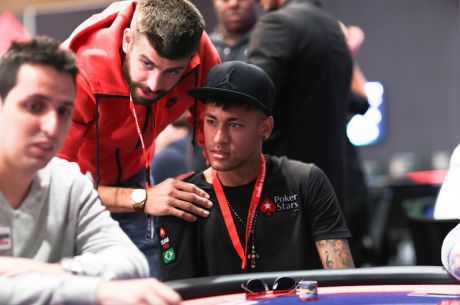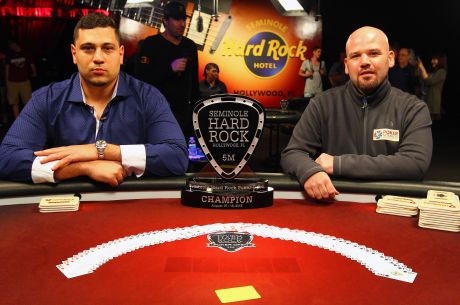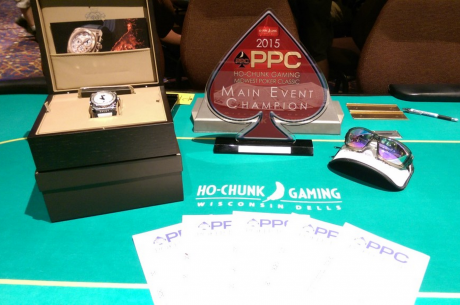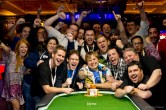Hold��em with Holloway, Vol. 45: Satellite Dilemmas -- To Call or Not to Call
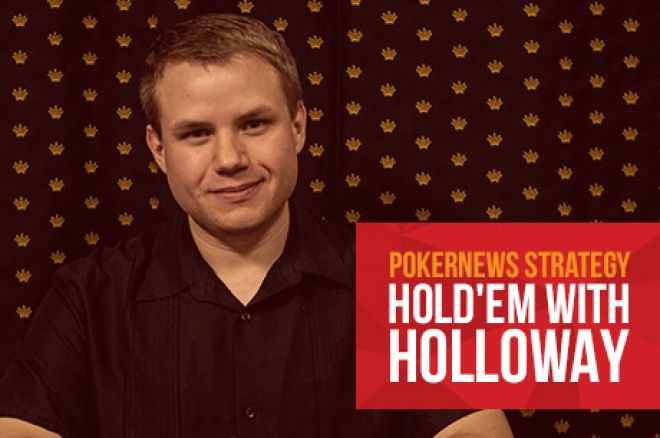
A little over a week ago, I attended the Mid-States Poker Tour Potawatomi stop in Milwaukee, Wisconsin. While there, I was approached by Michael Miller, a tour regular, who wanted to ask my opinion on a hand he��d played in a $250 MSPT qualifier that saw 20% of the field win a seat into the $1,100 Main Event.
The hand was interesting, and Miller was kind enough to allow me to discuss the hand in this week��s Hold��em with Holloway. Here��s the situation��
The qualifier drew 50 players, meaning the final 10 would get a seat. The hand in question happened on the bubble with 11 remaining and the blinds at 1,500/3,000/300. Miller��s table had six players, and action folded around to the player in the hijack, who was the extreme short stack. He moved all in for 6,300 �� just over 2x the big blind. The player in the small blind made the call, and Miller, who was the second-shortest stack with 33,500, opted to fold 6x3x-offsuit from the big blind.
The question is, should Miller have called?
Things aren��t always clear cut in poker. I think this is one such situation where, in my opinion, a case can be made either way.
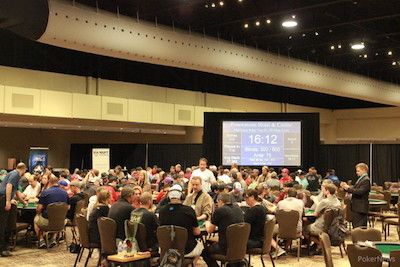
In this hand, there were 600,000 total chips in play, so with 11 left the average was 54,545. According to Miller, everyone else at his table was above average, while most others at the secondary table were as well (he believes the short stack over there to have had approximately 40,000).
It was a mere 3,300 for Miller to call, but that constituted nearly 10% of his stack. Was that amount worth risking to try to eliminate the hijack and end the tournament?
If he did call and both he and the small blind lost, the hijack would triple to 20,700 and Miller would drop to 26,900, making them near equal short stacks. If Miller folded and the hijack won, he would still have 30,200 while the hijack would double to 17,400.
My initial impression was that Miller should have called and taken a shot (better two players trying to knockout the hijack), but after considering the tournament structure (the blinds were going to increase to 2,000/4,000/400 in just over four minutes) and some subjective facts (Miller wasn��t going to play the Main Event unless he qualified, and this was the penultimate qualifier he could play), I��m okay with the fold.
With the blinds about to go up, assume that Miller called and the hijack managed to triple. Miller would then be left with six big blinds and the hijack five. With a fold and assuming the hijack won against small blind (of course, Miller will still get a seat if the small blind wins), Miller would be sitting on seven big blinds and the hijack four.
That three-big-blind gap as opposed to one can make a heck of a difference in these qualifiers, especially when you consider the blinds are about to pass Miller (he��ll have to pay the small at the ��reduced�� 1,500/3,000/300) and the increased blinds will hit the hijack first. In other words, the pressure would still be on the hijack to make a move before Miller had to. Meanwhile, if Miller calls and loses, they��d be on almost equal ground.
Of course if Miller had a better hand, he should have went with it. Likewise, had the small blind folded, I would call from the big blind. 6x3x-offsuit isn��t a great hand, but chances are you��re drawing live to low cards (the hijack is likely pushing with big cards). If you��re the only one standing between the short stack swiping the blinds �� especially when it only costs you a single big blind to defend �� and possibly bursting the bubble, I would take that shot. As it played out, though, Miller didn��t to take the chance as he had the luxury of leaving it up to the small blind.
For the record, the all-in player ended up holding 4x4x and the small blind 8?6?. The board ran out Qx9x2x6x7x rainbow, and the hijack was eliminated, thus awarding Miller and nine others a seat. Being results oriented, had the small blind folded and Miller defended the big blind, he would have turned a six to burst the bubble.
Satellites are a different breed than regular tournaments. Had it been the money bubble of a regular MTT, I would call in Miller��s shoes as you��re getting great odds and ideally are playing to win. But in satellites these exact sort of convoluted situations pop up all the time, and they can present some challenging decisions. Miller said he caught some flak from the other players for making a bad fold, but I don��t think that��s the case.
A call would have been just fine �� you couldn��t fault Miller for taking a shot at bursting the bubble for a single big blind. But in this particular case a fold was probably better. Oftentimes in satellites preserving your chips needs to be your top priority, no matter how tempting a call may be.
What are your thoughts on this hand? Would you have called or folded? Let me know on Twitter @ChadAHolloway.
Want to stay atop all the latest in the poker world? If so, make sure to get PokerNews updates on your social media outlets. Follow us on Twitter and find us on both Facebook and Google+!
In this Series
- 1 Hold��em with Holloway, Vol. 1: Making Reads and Trusting Them
- 2 Hold��em with Holloway, Vol. 2: Playing in Poker Charity Events
- 3 Hold��em with Holloway, Vol. 3: Throttle Back Before You End Up Punting
- 4 Hold��em with Holloway, Vol. 4: Punish the Satellite Bubble
- 5 Hold��em with Holloway, Vol. 5: What is Proper Accumulator Strategy?
- 6 Hold��em with Holloway, Vol. 6: A Chip and a Chair Story with ��SirWatts��
- 7 Hold��em with Holloway, Vol. 7: 15 Things About Poker I Wish I��d Known Sooner
- 8 Hold��em with Holloway, Vol. 8: Examining the Largest Overlay in Poker History
- 9 Hold��em with Holloway, Vol. 9: Differences Between Rebuys and Reentries
- 10 Hold��em with Holloway, Vol. 10: Five Must-Read Poker Books of 2014
- 11 Hold��em with Holloway, Vol. 11: When Will You Finally Break Through?
- 12 Hold��em with Holloway, Vol. 12: Dealing with a Target on Your Back
- 13 Hold��em with Holloway, Vol. 13: Knowing When to Call It Quits
- 14 Hold��em with Holloway, Vol. 14: Embarking on a Year-Long Weight Loss Journey
- 15 Hold��em with Holloway, Vol. 15: Navigating Multiple Decision Points in a Poker Hand
- 16 Hold��em with Holloway, Vol. 16: Chris Moorman Tells Me How Badly I Play Poker
- 17 Hold��em with Holloway, Vol. 17: Richard ��nutsinho�� Lyndaker on Getting It in Marginal
- 18 Hold��em with Holloway, Vol. 18: Getting Inside the Head of Poker Pro Brian Rast
- 19 Hold��em with Holloway, Vol. 19: Stupid Calls & Lucky Draws in MSPT WI Championship
- 20 Hold��em with Holloway, Vol. 20: Talking Ante-Only Strategy with Greg ��FossilMan�� Raymer
- 21 Hold��em with Holloway, Vol. 21: Contributing to Jonathan Little��s New Book
- 22 Hold��em with Holloway, Vol. 22: Consequences of Acting Out of Turn & Tossing in Chips
- 23 Hold��em with Holloway, Vol. 23: When It Comes to Chops, Do What��s In Your Best Interest
- 24 Hold��em with Holloway, Vol. 24: Accepting Bad Beats & Lessons in Selling Action
- 25 Hold��em with Holloway, Vol. 25: Heinz�� Ace-High Call Shows Why He's a World Champ
- 26 Hold��em with Holloway, Vol. 26: Is Keeping the Short Stack Alive Collusion?
- 27 Hold��em with Holloway, Vol. 27: Great Laydown or Bad Fold on Poker Night in America?
- 28 Hold��em with Holloway, Vol. 28: Calling Hellmuth with Jack-Deuce Offsuit
- 29 Hold��em with Holloway, Vol. 29: The Philosophy of "No-Chop" Chad
- 30 Hold��em with Holloway, Vol. 30: Preparing to Play the World Series of Poker
- 31 Hold��em with Holloway, Vol. 31: Staying on Your Grind at the World Series of Poker
- 32 Hold��em with Holloway, Vol. 32: The Perilous Decision to Call Off with Ace-Queen
- 33 Hold��em with Holloway, Vol. 33: Using Poker Skills in Reality TV Competitions
- 34 Hold��em with Holloway, Vol. 34: Esfandiari Explains How to Recover from Bad Beats
- 35 Hold��em with Holloway, Vol. 35: Tilly vs. Brunson in Super High Roller Cash Game Hand
- 36 Hold��em with Holloway, Vol 36: Unconventional Play Leads to Good WSOP Main Event Start
- 37 Hold��em with Holloway, Vol. 37: Lessons in Pot-Limit Omaha Hi-Low w/ Evan Jarvis
- 38 Hold��em with Holloway, Vol. 38: Things to Say and Do When You Bust a Poker Tournament
- 39 Hold��em with Holloway, Vol. 39: How Much Did I Have to Raise to Get You to Fold?
- 40 Hold��em with Holloway, Vol. 40: Practicing Patience in My Deep PPC Poker Tour Run
- 41 Hold��em with Holloway, Vol. 41: Analyzing a Questionable SHRPO Main Event Hand
- 42 Hold��em with Holloway, Vol. 42: Analyzing the Play of Neymar Jr. at EPT Barcelona
- 43 Hold��em with Holloway, Vol. 43: The Value of a Reliable Poker Reputation
- 44 Hold��em with Holloway, Vol. 44: John ��KasinoKrime�� Beauprez Rips My PLO Game Apart
- 45 Hold��em with Holloway, Vol. 45: Satellite Dilemmas -- To Call or Not to Call
- 46 Hold��em with Holloway, Vol. 46: Seiver Leverages the River in Super High Roller Bowl
- 47 Hold��em with Holloway, Vol. 47: What Untraditional Moves in Poker Might Mean
- 48 Hold��em with Holloway, Vol. 48: Thinking About the Future with Sam Grizzle
- 49 Hold��em with Holloway, Vol. 49: WCOOP Champ ��Coenaldinho7�� Offers Up His Biggest Hands
- 50 Hold��em with Holloway, Vol. 50: The Peril of Shoving Weak Aces
- 51 Hold��em with Holloway, Vol. 51: The Importance of Not Giving Up in Poker Tournaments
- 52 Hold��em with Holloway, Vol. 52: Does Asking ��Check�� Actually Constitute a Check?
- 53 Hold��em with Holloway, Vol. 53: Thomas Cannuli Impresses Even After Main Event Bustout
- 54 Hold��em with Holloway, Vol. 54: Dealers Aren��t Always Right
- 55 Hold��em with Holloway, Vol. 55: Don��t Get Married to Pocket Aces
- 56 Hold��em with Holloway, Vol. 56: Bazeley��s Survival Instinct Leads to Continued Success
- 57 Hold��em with Holloway, Vol. 57: Playing ��Deuces Wild�� on the European Poker Tour
- 58 Hold��em with Holloway, Vol. 58: The Wildest Hand in European Poker Tour History
- 59 Hold��em with Holloway, Vol. 59: Death, Zombies & Spending Time w/Phil Hellmuth
- 60 Hold��em with Holloway, Vol. 60: How the Unstoppable Fedor Holz Managed to Win Again
- 61 Hold��em with Holloway, Vol. 61: Lessons To Be Learned When You Hit the Big Stage
- 62 Hold��em with Holloway, Vol. 62: Steve O��Dwyer Explains the ��Oreo Cookie Tell��
- 63 Hold��em with Holloway, Vol. 63: What Would Happen to a Chip Stack If a November Niner Died?
- 64 Hold��em with Holloway, Vol. 64: Forgetting One Chip -- Should It Still Be an All-In Bet?
- 65 Hold��em with Holloway, Vol. 65: Todd ��sharkslayerrr�� Breyfogle on Bankroll Management
- 66 Hold��em with Holloway, Vol. 66: Cash Game Pro Daniel Arfin Offers Sound Bankroll Advice
- 67 Hold��em with Holloway, Vol. 67: Honeyman Plays Kings to Keep in Opponent��s Bluff Range
- 68 Hold��em with Holloway, Vol. 68: Why Do I Even Bother Drinking at the Poker Table?
- 69 Hold��em with Holloway, Vol. 69: Is Your Favorite Poker Pro Left- or Right-Handed?
- 70 Hold��em with Holloway, Vol. 70: In Order to Live You Have to Be Willing to Die
- 71 Hold��em with Holloway, Vol. 71: How to Amass a Big Stack Early in a Poker Tournament
- 72 Hold��em with Holloway, Vol. 72: Answering User-Submitted Poker Scenarios
- 73 Hold��em with Holloway, Vol. 73: Saying Goodbye with a Top Five List
- 74 Hold'em with Holloway, Vol. 74: We're Back, Baby!
- 75 Hold'em with Holloway, Vol. 75: Jivkov on Exploiting Capped Ranges
- 76 Hold��em with Holloway, Vol. 76: Matt Bretzfield Gets Tricky With Aces
- 77 Hold'em with Holloway, Vol. 77: Joseph Cheong Gets Crazy with a Pair of Ladies
- 78 Hold'em with Holloway, Vol. 78: Wyoming Poker Action & Wild South Dakota Hand
- 79 Hold'em with Holloway, Vol. 79: Calling Controversy at WinStar
- 80 Hold'em with Holloway, Vol. 80: Going for Value with Matt Hunt
- 81 Hold'em with Holloway, Vol. 81: Bracelet Winner Ryan Leng on Bad Call
- 82 Hold'em with Holloway, Vol. 82: Romeopro33 Recounts XL Eclipse Victory
- 83 Hold'em with Holloway, Vol. 83: Men The Master Doesn't Get Paid
- 84 Hold'em with Holloway, Vol. 84: Harman Hits Back-to-Back Miracle Turns
- 85 Hold'em with Holloway, Vol. 85: Jamie Kerstetter on Dealing with Bounties
- 86 Hold'em with Holloway, Vol. 86: Matt Stout Develops a Limp Dynamic
- 87 Hold'em with Holloway, Vol. 87: Matt Alexander Caught in Between w/ Two Red Aces
- 88 Hold'em with Holloway, Vol. 88: John Beauprez on Why He Folded a Set of Jacks
- 89 Hold'em with Holloway, Vol. 89: Alex Aqel Lets Opponent Hang Himself with Aces
- 90 Hold'em with Holloway, Vol. 90: David Peters Makes Beastly Call Against Will Givens
- 91 Hold'em with Holloway, Vol. 91: Poker Lessons from a Game of Risk
- 92 Hold'em with Holloway, Vol. 92: My Upstuck Diagnosis by the CLC Squad
- 93 Hold'em with Holloway, Vol. 93: Alex Foxen Coolers Nick Petrangelo in SHRB
- 94 Hold'em with Holloway, Vol. 94: My $25,000 PSPC Experience at 2019 PCA
- 95 Hold'em with Holloway, Vol. 95: The Equity of Leveraging Time Extensions
- 96 Hold'em with Holloway, Vol. 96: Dan O'Brien on Developing Healthy Routines
- 97 Hold'em with Holloway, Vol. 97: Big Hands From the WSOP-C Potawatomi
- 98 Hold'em with Holloway, Vol. 98: Simon Deadman Rips Apart My NLH Tourney Play
- 99 Hold'em with Holloway, Vol. 99: Shoving 10-6 Smack Dab Into Pocket Aces
- 100 Hold'em with Holloway, Vol. 100: The Revived Re-Entries Debate

